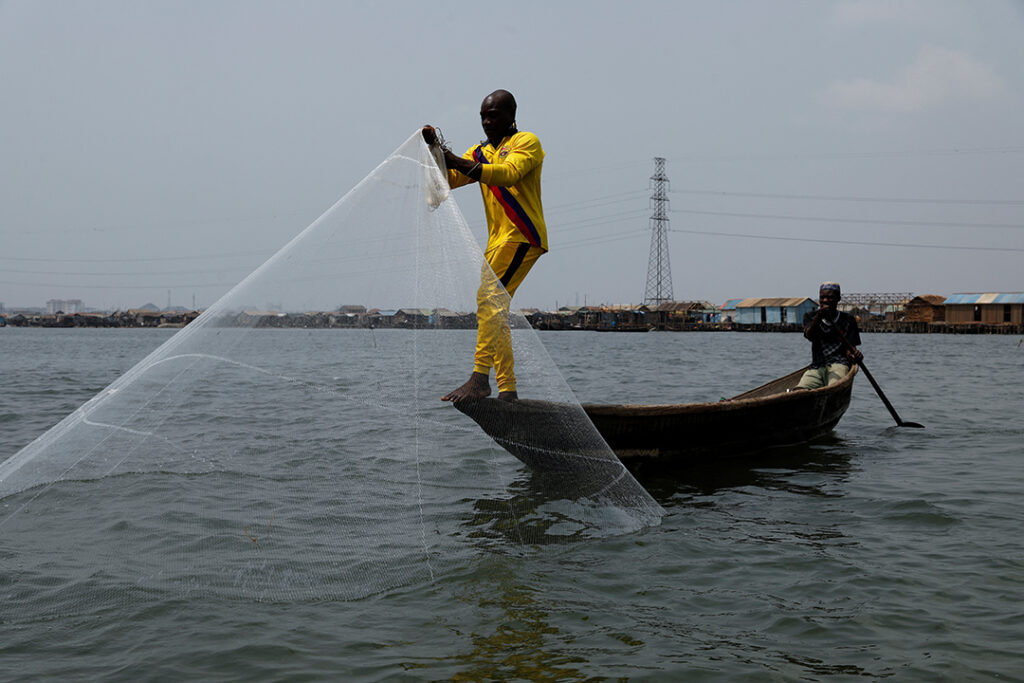ADF STAFF
A large industrial fishing vessel casts its massive net off the coast off Saint-Louis, Senegal. The net, which looks like a halo atop the water, can catch more fish in a week than an artisanal canoe can catch in a year.
There was a time when local fishermen made a satisfactory living fishing in their own waters, but the influx of foreign trawlers has decimated fish stocks in Saint-Louis and around West Africa.
Illegal, unreported and unregulated (IUU) fishing costs the region $2.3 billion each year, according to the United Nations. IUU fishing is also linked to other sea crimes, such as piracy, human trafficking and drug smuggling.
Yague, a Senegalese fisherman for more than 30 years, recently spent an entire day on the water only to come home with empty nets.
“When we go out we see these foreign ships, which are the reason there’s no more fish,” Yague told Australian television program “Foreign Correspondent.” “They used to swim up to us. We were wealthy, but ever since these industrial vessels came the fish started to disappear.”
When industrial vessels notice small-scale fishermen in the same waters, they often ram the canoes, destroy their nets and steal whatever catch they might have, Yague said.
It can be a deadly way to make a living.
Doudou Sene was a small-scale fisherman in Saint-Louis. One day, he and his son Youssoufa were fishing from their canoe when they noticed a ship approaching.
“When we tried to get out of its way to let it pass, we collided,” Sene told Foreign Correspondent. “I fell into the water. My arm was stuck between the ship and the pirogue. I was underwater for a long time and thought about the propeller that would crush me. When I got my head above the water I saw it was a foreign ship. No one could stop it. It just left. My son died on impact. I lost my arm. I survived that day, but I’ll never forget it.”
Sene, who can no longer fish, covered his eyes and wept.
In Senegal, the global network Greenpeace helps authorities track illegal fishing. In other parts of West Africa, Sea Shepherd Global helps local authorities board and inspect vessels suspected of illicit activities.
Sea Shepherd’s services cost nothing for participating countries. The organization currently operates in Benin, Gabon, The Gambia, Liberia, Namibia, Sao Tome and Principe and Sierra Leone, as well as Tanzania.
In early September, Sea Shepherd helped Namibian authorities arrest a trawler that carried an illegal amount of shark fins.
“These are the places where we draw our line in the sand and say to the poachers, ‘You go this far, but no farther,” Peter Hammarstedt, director of campaigns for Sea Shepherd, told Foreign Correspondent.
Hammarstedt said Chinese trawlers are by far the region’s worst illegal, unreported and unregulated (IUU) fishing operators. The IUU Fishing Index agrees.
Sea Shepherd also has had recent success in Liberia and Gabon.
“Overfishing is one of the largest challenges facing the world’s oceans,” Hammarstedt said. “If we can assist to shut down illegal fishing in those places, then we can assist in shutting down illegal fishing all around the African continent.”
Brig. Gen. Geraldine Janet George, the deputy chief of staff of the Liberian Armed Forces, was appreciative of Sea Shepherd’s presence in the country’s waters since 2017.
“Those [illegal] vessels knew that the Liberian Coast Guard didn’t have the capability to go deep into the water, so they took advantage, and came to fish,” George told Foreign Correspondent. “It was time to act, because our local fishermen were going to be completely out of business.”

